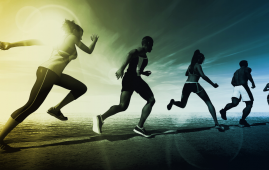

About 1 in 2 women and 1 in 3 men will experience incontinence at some point in their life, according to the U.S. Department of Health and Human Services. The number is probably more than that. Many people are too embarrassed by their incontinence to talk to their doctor about treatment. Others think incontinence is a fact of life as we age and don’t know that treatments exist. For many, fear of leakage or odor affects their daily activities and their ability to enjoy their relationships and social life.
Overall, incontinence is an involuntary leaking of urine. But it’s not as simple as it sounds. There are different types of urinary incontinence, each with unique causes and treatments.
Two of the most common types of incontinence, especially among women, are stress incontinence and urge incontinence.
Understanding the difference can help you and your doctor choose the right Urinary Incontinence treatment.
What Is Stress Urinary Incontinence?
Stress urinary incontinence is the most common kind of incontinence, especially in women. In fact, 33% of women will experience stress urinary incontinence. This type of incontinence happens when urine leaks due to physical activity putting pressure on the abdomen, which also puts pressure on the bladder. Some common activities that trigger this type of incontinence are:
- Coughing
- Sneezing
- Laughing
- Running
- Lifting
- Standing up or bending over
Normally, only a small amount of urine leaks, but even a little bit is enough to make a person feel self-conscious and uncomfortable.
Stress incontinence can happen because the muscles and structures in the urinary tract have become too weak or damaged to control urination as well as they used to. In women, this can be a result of aging or damage to muscles and nerves during childbirth. In men, pelvic injuries or prostate surgery are common causes of Urinary Incontinence.
Treatments include exercises for the pelvic floor muscles, lifestyle changes, or surgery. Other ways to manage it include pads or devices that help prevent leaks.
What Is Urge Incontinence?
Urge incontinence is leakage that happens after you feel an overwhelming need to urinate, often many times during the day and at night. The urge is sudden, intense, and doesn’t always leave you enough time to make it to the bathroom. It can be very disruptive to your everyday activities.
Urge incontinence can happen even if the bladder isn’t full. It’s caused by a physical problem that keeps your brain and body from communicating correctly about your bladder. Urge incontinence can be caused by spine, brain, or nerve damage. Common causes are accidents, neurological conditions like Parkinson’s, prostate issues, stroke, or diabetes, but the cause isn’t always known.
Treatments for urge incontinence include lifestyle changes, medications that relax the bladder muscle, or surgery.
Urinary Incontinence Doesn’t Have to Control Your Life
Incontinence can affect every part of a person’s life. It’s not only a physical problem – it can also affect social, emotional, psychological, and sexual aspects. Many people suffering from incontinence feel shame or embarrassment, have anxiety about odor and leaking, avoid intimacy with their partners, and feel like their quality of life is less than it could be.
Does that sound like you or someone you know? There may be treatments available to help regain your life. You don’t have to let incontinence come between you and the people and things you enjoy.
more recommended stories
 AI Predicts Chronic GVHD Risk After Stem Cell Transplant
AI Predicts Chronic GVHD Risk After Stem Cell TransplantKey Takeaways A new AI-driven tool,.
 Rising Measles Cases Prompt Vaccination Push in NC
Rising Measles Cases Prompt Vaccination Push in NCKey Highlights 15 confirmed Measles cases.
 High-Fat Diets Cause Damage to Metabolic Health
High-Fat Diets Cause Damage to Metabolic HealthKey Points Takeaways High-fat and ketogenic.
 Chronic Brain Compression Triggers Neuron Death Pathways
Chronic Brain Compression Triggers Neuron Death PathwaysKey Takeaways Chronic brain compression directly.
 Texas Medical Board Releases Abortion Training for Physicians
Texas Medical Board Releases Abortion Training for PhysiciansKey Takeaways Texas Medical Board has.
 Needle-Thin Brain Implant for Layer-Specific Brain Research
Needle-Thin Brain Implant for Layer-Specific Brain ResearchKey Takeaways Researchers have developed a.
 Pancreatic Cancer Research: Triple-Drug Therapy Success
Pancreatic Cancer Research: Triple-Drug Therapy SuccessKey Summary Spanish researchers report complete.
 Immune Cell Epigenome Links Genetics and Life Experience
Immune Cell Epigenome Links Genetics and Life ExperienceKey Takeaway Summary Immune cell responses.
 Chronic Pain Linked to CGIC Brain Circuit, Study Finds
Chronic Pain Linked to CGIC Brain Circuit, Study FindsKey Takeaways University of Colorado Boulder.
 High-Intensity Training and Oxidative Stress Insights
High-Intensity Training and Oxidative Stress InsightsNew Evidence Linking High-Intensity Training and.

Leave a Comment